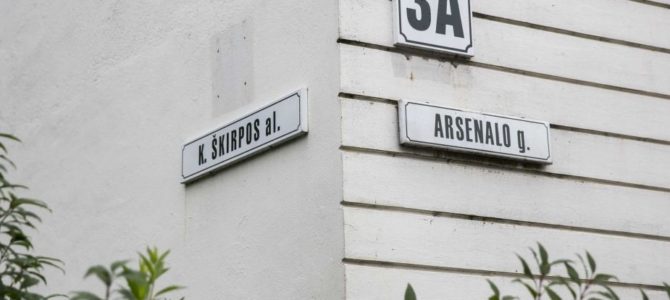Photo: Lukas Balandis/15min.lt
by Violeta Grigaliūnaitė
A decision to rename Škirpa Alley at the base of Gediminas Hill in Vilnius is brewing within the city council. Municipality administration director Povilas Poderskis has received a request to initiate a decision by the Vilnius city council to rename it Tricolor Alley. Freedom Party faction member Renaldas Vaisbrodas prepared the request. The small street next to the Vilnia creek was named after Kazys Škirpa in 1998.
At Issue: A Finding by the Center for the Study of the Genocide and Resistance of Residents of Lithuania
Vaisbrodas included compelling arguments for the decision in his request. Here is an extract from an historical finding by the Center for the Study of the Genocide and Resistance of Residents of Lithuania signed by director Birutė Burauskaitė:
“The historians of the Center for the Study of the Genocide and Resistance of Residents of Lithuania have performed an exhaustive examination of the activities of Kazys Škirpa in World War II. The actions of the historical figure of Kazys Škirpa are subject to multiple interpretations. On the one hand, he was a Lithuanian patriot who exerted major efforts for the foundation of national independence and for resistance to the Soviet occupational regime. On the other hand, there were expressions of anti-Semitism in his activities in 1940 and 1941.
“One may fault Škirpa and the organization he led because anti-Semitism was raised to a political level in the actions of the Berlin Lithuanian Activists Front and that might have encouraged some Lithuanian residents to get involved in the Holocaust. On the other hand it must be noted the Berlin LAF organization proposed solving “the Jewish problem” not through genocide, but by expulsion from Lithuania. It also must be noted members of the Berlin LAF organization did not know on the eve of war the Nazis planned to carry out the total genocide of the Jews.”
This excerpt comes from a finding presented on April 17, 2019, to the Vilnius municipal commission on names, monuments and commemorative plaques.
Full article in Lithuanian here.


